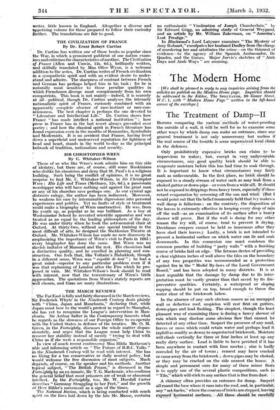SIR CHRISTOPHER WREN By C. Whitaker-Wilson
Those of us who like Wren's work admire him on this side of idolatry, but there are, of course, still some Ruskinians who dislike his classicism and deny that St. Paul's is a religious building. Such being the eonffict of opinions, it is no great surprise to find Mr. C. Whitaker-Wilson, in Sir Christopher Wren : His Life and Times (Methuen, 125. 6d.), a passionate worshipper who will have nothing said against the great man vr any of his churches save perhaps one. As our cynical age distrusts eulogy, the author has been indiscreet. Moreover, he weakens his case by interminable digressions into personal experiences and politics. Yet no faults of style or treatment Could make a biography of Wren unattractive. He was, from his youth up, as popular as he was brilliant. As a boy at Westminster School he invented scientific apparatus and was treated as an equal by the leading philosophers of the day. Be was under thirty when he took the astronomical chair at Oxford. At thirty-two, without any special training in the imost difficult of arts, he designed the Sheldonian Theatre at Oxford. Mr. Whitaker-Wilson has made no new discovery in emphasizing the importance of Wren's visit to Paris in 1665: every biographer has done the same. But Wren was no slavish imitator of Mansard and the rest. Ills classicism had a distinctive quality, and be excelled in planning and con- Struction. One feels that, like Voltaire's Habakkuk, though In a different sense, Wren was "capable de lout"; he had a great mind—superior to any particular problem even if it Was that replanning of London after the Fire which he pro- posed in vain. Mr. WhitaKer-Wilson's book should be read with interest, now that the tercentenary of Wren's birth /approaches. The quotations from Wren's stately reports are well chosen, and tkuiTe are many illustrations.


















































 Previous page
Previous page